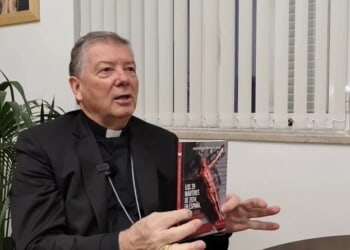Cllr Ruby Sampson is a councillor for Cockfosters Ward on Enfield Council.
Robert Jenrick’s now infamous video about tube fare dodging undoubtedly hit a nerve with every Londoner who pays for the privilege of using the London Underground. This is a privilege arguably that gets more and more uncomfortable each year. The tube gets more crowded, more unreliable, more expensive and of course, if you’re on the central line, even hotter.
Currently, 1 in 14 passengers are dodging fares on parts of the London transport network costing me, you, the taxpayer a whopping £190m a year (2024-5). The cost of tube and rail fares went up by an average of 4.6 per cent in 2025 and my commute to the office costs £15.30 a day.
Undoubtedly, fare increases impact the hardworking Londoner battling the cost of living crisis, as well as the busy commute. These fare increases are to cover the fares of those who choose not to pay. They punish the saint, not the sinner.
On the way to Conservative Party conference, standing in front of me to use the ticket barrier, one woman pushed herself, a friend and a child through the barriers on one Oyster card at Euston. I was momentarily shocked, that people continue to fare dodge so blatantly, and the costs for all of us continue to climb…
Fare evasion is a crime that has become normalized, with the rule breakers reckless and nonchalant. Yet while the viral Robert Jenrick video ignited a spark in all of us due to the injustice of this very visible crime, I hope to showcase a crime in parallel.
This month a British Transport Police officer was convicted of assault for doing his job. Convicted for making an arrest. PC Adrian Young, 48, was charged in connection with an incident at Camden Road where a fare dodging teenager pushed her way through the ticket barriers.
Despite the 15 year old girl being arrested she was later de-arrested at the scene and the officer was accused of using an ‘unacceptable use of force against a child.’ When pushing through a barrier at the station, she seemed to be aware of right from wrong and not acting with the ignorance or innocence of a child, yet she is treated as the innocent party.
Police officers put on uniform every day. Their uniform is not a superpower. They’re citizens in uniform; normal people who deal with extremely violent situations daily where their safety is never the priority. Yes, officers are expected to maintain control of a situation, but that should involve appropriate force where necessary.
The public have long been calling for more rigorous and robust action from officers when dealing with crime. But when this happens, what is the result?
At Conference, Kemi Badenoch announced she would ‘triple stop and search’. I am an adamant believer in stop and search. It remains the best deterrent we have for saving lives. If you have any doubts I urge you to follow any Police‘s Twitter/X account to see the weapons they take off our streets via stop and search. (See Caledonian Road Police’s post.) But this can only be an effective policy if we back officers that use it.
Police officers catch the criminals, but who does the time?
Not the teenager wielding a knife against PC Lorne Castle. It was PC Lorne Castle who lost his job because he didn’t use respectful language when arresting a teenager threatening him with a knife. A decorated, award winning officer lost his job, because in the face of violence his choice of words was deemed the bigger threat (undermining police ideals) than the knife. One would have thought he was someone Dorset police would have liked to retain on the beat.
We live in a world where the mere words of an officer under extreme stress, facing the threat of a knife, is considered more damaging than the actual perpetrators of crime.
Despite a knife being found on the boy an independent panel found that PC Castle did not treat the teenager with courtesy or respect. Courtesy and respect would not be high up on the agenda of most people when up against the threat of a knife which, as it happened, he did have on him.
Police officers catch the criminals, but who does the time?
PC Perry Lathwood has only just successfully appealed his conviction of assault for arresting a women who refused to show her bus ticket. When asked to show she had paid her fare by a bus inspector the passenger walked off causing PC Lathwood to become involved.
She claimed she did not see her refusal to show she had paid her fare as resisting the police, which begs the question: if the public does not see refusal to engage with the police as resistance, how can the police tell the difference between a law abiding citizen and someone trying to hide something?
The Independent Office for Police Conduct (IOPC) has entered a war over words with hard working officers. Yes, PC Lathwood’s words in the heat of the moment were not perfect. But the written warning he was handed was all this case should ever have come to – not a full blown criminal investigation taking years. How can officers stop fare evasion if someone refusing to show they have indeed paid for their ticket, has more right not to engage with an officer than the officer has to arrest them for failing to cooperate with the police.
Police officers catch the criminals, but who does the time?
PC Mahmood was dragged through the courts much to the detriment of his mental health and career for tasing Jordan Walker-Brown. Walker-Brown reached for his waistband while running from police and did not respond when asked to stop and officers believed he had a knife and was going to attack him, so needed to be “contained”.
Officers have to make split second decisions. If they don’t, others face danger. However, it was PC Mahmood that was deemed guilty until he was finally cleared of gross misconduct.
So they catch the criminals, and often keep the public safe as a result, but the story does not end there. Despite catching criminals it’s the police that do the time – for simply doing their job. It’s the police again and again who face brutal social media campaigns against them, reduced duty, suspension, and personal devastation for doing nothing more or less than the job the public expect them to do.
So I’ll say this: the Jenrick video rightly highlighted the spiralling problem of fare evasion but it failed to answer the question – what next?
I propose that the Home Secretary launches a root and branch reform of the IOPC. When it is decided officers must face misconduct hearings, their cases must be fast tracked. This would avoid cases, which have become far too common, where officers have waited 2 years or in some cases much more, to be handed only written warnings.
The IOPC claims: ‘We are a diverse team of people from a wide range of backgrounds and professions’; yet none of their senior leadership team, at executive, non-executive, or director level, have ordinary police experience. There should at the very least be, at director level, a former officer that has response team experience or Safer Neighbourhood Team experience.
Currently the closest IOPC member to this on their website is an ex-Royal Military Police officer, which most can understand, is very different and not an accurate reflection of normal day to day policing. The rest of the leadership team is comprised of former civil servants and those who previously worked for healthcare and charity commissions and boards across the public sector. Whilst they stress expertise and aptitude for handling complaints, they seem to be missing someone to provide the lived experience of officers. Who is advising on the other side?
This must change. Or else more good officers will be punished by a one sided system which has experience of the complaints side – but not of the thin blue line. The current situation assumes the worst of our over stretched and under resourced officers.
Lastly, but certainly, not least, the IOPC should be prohibited from taking officers through misconduct proceedings after criminal courts have cleared them of all charges. Frequently officers have been cleared of all charges in criminal courts within only a few hours, only for afterwards the IOPC to take them through misconduct proceedings. So, despite being found innocent, they’ll likely still lose their jobs.
We must stop the IOPC’s actions against decent, honest, and hardworking officers who are simply doing their jobs, often in very difficult circumstances.
Next time you see a fare evader at a tube station, remember PC Adrian Young, he was arrested for doing his job – arresting a fare evader. No wonder officers are leaving the police in droves.









![Florida Officer Shot Twice in the Face During Service Call; Suspect Killed [WATCH]](https://www.right2024.com/wp-content/uploads/2025/12/Inmate-Escapes-Atlanta-Hospital-After-Suicide-Attempt-Steals-SUV-Handgun-350x250.jpg)







